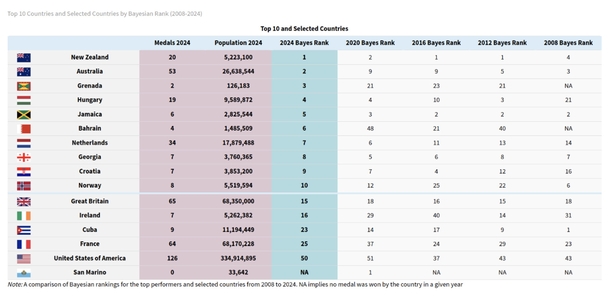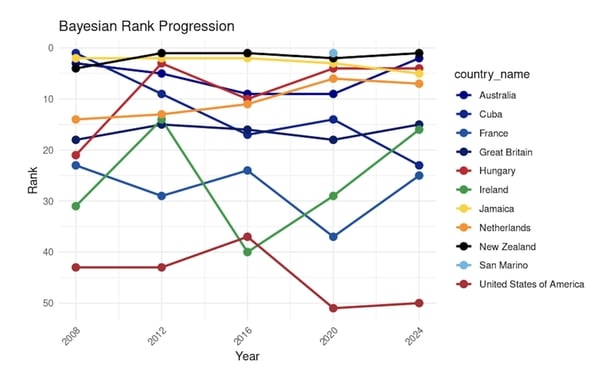Analysis: If we want to identify Olympic nations efficiently developing their sporting talent, we need to look at more than just total medal counts
By Cormac McDermott, Carl Scarrott and John Ferguson, University of Galway
In the wake of another Summer Olympic Games, we are feeling proud as a nation of our global sporting ability for a change. Ireland's seven medals - including four gold - placed us 17th on the standard lexicographic medal table, which ranks countries based on their gold medal count first, followed by silver and bronze.
At first glance, it seems we've made significant strides in recent years, building the infrastructure and implementing the development systems necessary to foster our sporting talent. This is especially so when we consider that many of the countries ahead of us are much larger.
We need your consent to load this rte-player contentWe use rte-player to manage extra content that can set cookies on your device and collect data about your activity. Please review their details and accept them to load the content.Manage Preferences
From RTÉ Radio 1's This Week, Olympic Council of Ireland president Sarah Keane reflects on Ireland's most successful Olympics to date
However, this logic raises a key issue with using total medal counts to rank countries as such rankings inherently favour larger countries. Due to their larger populations they have a higher probability of producing world-class athletes purely by chance. This approach doesn't truly reflect a nation's sporting prowess or efficiency in developing athletic talent.
One alternative to total medal counts is to scale medal counts on a per capita basis, measuring the number of medals won relative to the population size. This would allow us to compare nations as though they were all the same size.
Can we look at a medal table ranked on a per capita basis and confidently state that the countries ranked at the top are indeed best at developing sporting talent? The talented individual athletes of Grenada, Dominica and St. Lucia then need to be acknowledged because they are significantly above the rest.
We need your consent to load this rte-player contentWe use rte-player to manage extra content that can set cookies on your device and collect data about your activity. Please review their details and accept them to load the content.Manage Preferences
From RTÉ Radio 1's News At One, Brainstorm author Eimear Kelly from MTU on how athletes like Kellie Harrington inspire kids to play sports
However, this method fails to account for the randomness inherent in modelling medal wins. For such small nations, a single medal drastically skews the results, leading to large fluctuations in rankings between Olympic cycles. As a result, the per capita approach does not necessarily reflect the quality of a nation’s sporting infrastructure or athletic ability as it is just a summary of what happened at one Olympic Games.
If our goal is to identify nations efficiently developing their sporting talent, we should rank countries in a way that both adjusts for large population sizes and the "lucky" or more occasional medals a small nation wins. This is the essence of our Bayesian ranking approach. Bayes' Theorem is a famous rule in statistics that can combine prior beliefs about the probability of an event with observed data to give a more precise posterior belief about the probability and the uncertainty around it. In this context, we aim to infer the countries that it is best to grow up in to have the highest probability of winning an Olympic medal through the ranking of the posterior belief about these probabilities – which in turn will better reflect the sporting development systems.
Prior beliefs about this probability for a particular country can be deduced in many ways. In our case, we infer what might be expected in a particular country by examining the distribution of per-capita medal ratios across all other countries. In other words, if we had no specific knowledge pertaining to medal counts in a particular country of interest (for instance, in Ireland), the prior distribution describes the general distribution of medal winning probabilities around the world. These vague prior beliefs are then combined with the country’s medal count and population size to calculate the Bayes’ (or posterior) estimate of the probability.
When we run the model over the last five Olympic cycles, we see New Zealand outperforming almost all other nations
In doing so, we assume that each citizen has a small independent chance of winning a medal according to this probability. While the actual medal count is random, we would expect to observe a certain number of medals on average from a country if we were to repeat the Olympics many times. This process of combining prior beliefs with data will average out those once-off spikes and result in a downward adjustment to the per-capita medal ratios for smaller population countries at the top of the per-capita table, reflecting the fact that the exceptional performance in these countries in the 2024 Olympics is unlikely to be repeated in future Olympics.
The principle of a Bayesian ranking approach to Olympic medal tables is to order countries by the so-called posterior estimates of these probabilities. The results from our Bayesian ranking algorithm for the 2024 Olympic games puts New Zealand as top performer. In fact, when we run the model over the last five Olympic cycles, we see New Zealand outperforming almost all other nations, providing evidence that this approach gives a sensible and stable measure of a countries’ ability to develop Olympic medal winners.


A lot of parallels can be drawn between New Zealand and Ireland: similar population sizes, average climate and stunning scenery. However, Ireland has twice the GDP of New Zealand so we should have the advantage of more financial choice, but we consistently do worse. So, what is New Zealand doing that we can learn from to develop our sporting talent?
New Zealand is known to have a strong sporting and outdoor culture, particularly from early childhood schooling, and excels internationally in sports like rugby, rowing and sailing. It's not that Ireland does not have a strong sporting culture, but we focus much of our resources on Gaelic games which are not Olympic sports (not since 1904 at least). While this is extremely important to our cultural identity, it is unfortunate that we cannot showcase this sporting prowess on a global scale to the same extent as New Zealand do in the Olympic games.
We need your consent to load this rte-player contentWe use rte-player to manage extra content that can set cookies on your device and collect data about your activity. Please review their details and accept them to load the content.Manage Preferences
From RTÉ Radio 1's Drivetime, Minister for Sport Thomas Byrne on the announcement of €173m in funding for 35 sports projects
At an even deeper level, New Zealand do not necessarily focus on high-profile events which are heavily invested in by richer countries such as the United States and Australia. Instead, they make focused decisions for their limited total funding towards the events and athletes where they have the greatest probability of success. For example, they have a very tough qualifying standard for the games: only sending athletes that they believe can achieve a top 16 placing. In their words, they aim for the best bang for their buck. However, there are issues with such targeted funding decisions as they may not deliver as many benefits to wider society as investing in sports where medals are harder to get.
Ireland is a wealthier country and we should, in theory, be able to match New Zealand’s resources for Olympic talent development, while also supporting Gaelic games. With Budget 2025 allocating a sports fund of €230 million euro to develop our sports infrastructure (up 50% on two years ago) we may start to see improvements in our Olympic performance, reflecting the potential of our country.
But to make the most of this investment, we need to base our decisions on sound statistical evidence and answer such questions as 'who’s doing well at developing their sporting talent that we can learn from?;, 'what sports and disciplines should we best invest in, to better our society or improve Olympic medal performance?' and 'which athletes should we back?'. As we continue to increase our sports budget in line with our continued sporting improvement, understanding the randomness underneath the data to answer these sorts of questions is essential to improving our performance on the world stage and our country’s wider sporting culture.
Follow RTÉ Brainstorm on WhatsApp and Instagram for more stories and updates
Cormac McDermott is a PhD student in Applied Statistics at the University of Galway. Prof Carl Scarrott is an Established Professor of Statistical Science in the School of Mathematics, Statistics and Applied Mathematics at the University of Galway. He is a former Research Ireland awardee. Dr John Ferguson is a lecturer (above the bar) in Statistical Science in the School of Mathematical and Statistical Sciences at the University of Galway. He is a former Research Ireland awardee.
The views expressed here are those of the author and do not represent or reflect the views of RTÉ

